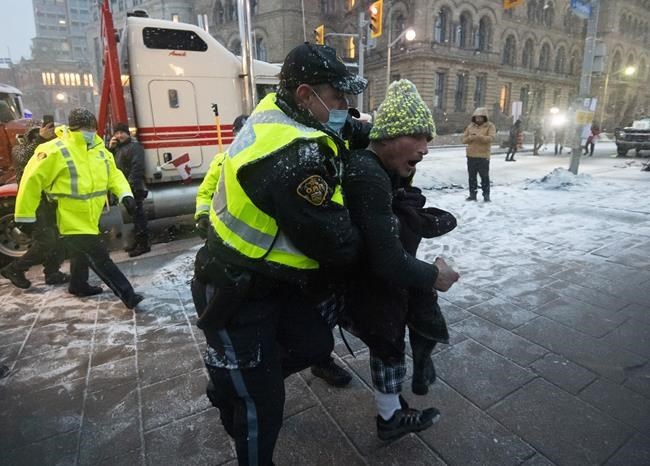
Police make an arrest after a person interfered with a police operation in Ottawa on Thursday, Feb. 17, 2022. THE CANADIAN PRESS/Justin Tang
October 27, 2022 - 12:07 PM
OTTAWA - The public inquiry examining the federal government's use of the Emergencies Act to clear "Freedom Convoy" protesters from Ottawa streets and several border crossings in February is tasked with answering a central question: Was the decision to invoke emergency powers necessary and justified?
As the commission stretches into its second week of public hearings with testimony from police and city officials, here is how some witnesses have answered that question:
Ottawa Police Service
Supt. Robert Bernier, who oversaw a command centre, said Ottawa police developed a plan by mid-February using existing laws to remove protesters. That plan involved the Ontario Provincial Police securing 34 tow trucks and drivers, promised anonymity, to remove vehicles.
But under cross-examination, a lawyer for the federal government asked Bernier if he was aware that plan fell apart and that drivers were unwilling to get involved. The inquiry was shown a Feb. 17 letter from the OPP warning tow truck drivers they could be compelled to participate in the effort to clear out the area around Parliament Hill.
Asked whether he agreed the emergency powers to compel towing services were helpful and beneficial, but not necessary, Bernier said yes, with a caveat that before Feb. 13, they were having challenges getting tow truck companies to help.
Bernier said he agrees with Ottawa's interim police chief, Steve Bell, that the legislation helped create an exclusion zone, but police had plans to create one of their own. Bell also said regardless of the legislation triggered on Feb. 14, police had a plan to clear protesters.
Acting deputy chief Trish Ferguson said the legislation "greased the wheels" on the existing police plan.
Ontario Provincial Police
"The Emergencies Act was not required to formulate an effective police response to this situation," the force said in a report submitted to the Public Order Emergency Commission.
The provincial force helped clear blockades in Ottawa and Windsor, Ont. The report says that while the emergency powers "provided supplementary tools for police" they believed existing laws gave police tools to deal with "Freedom Convoy" protests.
Ontario Provincial Police Commissioner Thomas Carrique said the Emergencies Act "was extremely helpful" to indemnifying tow truck drivers, but he also felt the police hadn't exhausted all existing powers by Feb. 14.
Royal Canadian Mounted Police
RCMP Commissioner Brenda Lucki emailed Public Safety Minister Marco Mendicino's office on Feb. 14, to say "we have not yet exhausted all available tools." The Liberal government invoked the legislation hours later.
Lucki said in the email, released through the public inquiry, that she believed charges could be laid under existing Criminal Code offences.
But in her testimony before the parliamentary committee that is also studying the decision to invoke the act, Lucki said there were times that the RCMP would have used the powers under the act had it been invoked earlier.
"In RCMP jurisdiction, we successfully used a measured approach and existing legislation to resolve border blockades," Lucki told the committee on May 10. She added that the powers granted by the Emergencies Act did prove useful in dislodging the protesters who had become entrenched in Ottawa's streets for weeks.
Lucki is scheduled to testify at the inquiry in the coming weeks.
Former Ottawa mayor Jim Watson
The former mayor voted against a city council motion asking for the Emergencies Act to be used in February.
But he testified to the commission that he felt it was necessary, saying he feared protests would have dragged on for weeks longer without the emergency powers.
Ontario Premier Doug Ford
Ford is fighting a summons to appear as a witness at the inquiry and declined requests to be interviewed by commission lawyers. However, while speaking to reporters at a recent event, he said Ontario stood "shoulder to shoulder" with Prime Minister Justin Trudeau and his decision to invoke the Emergencies Act.
This report by The Canadian Press was first published Oct. 27, 2022.
News from © The Canadian Press, 2022